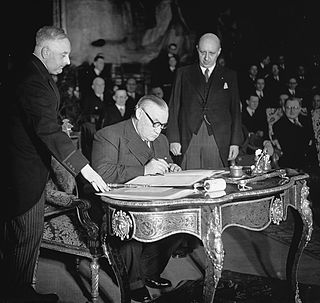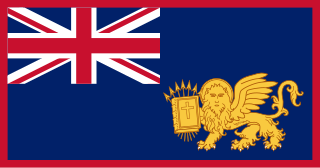The Treaty of Lisbon is a treaty on the borders of Spain and Portugal from the mouth of the Minho River to the junction of the Caia River with the Guadiana River. Signed in Lisbon on 29 September 1864, it abolished the Couto Misto microstate.
The final act of approving annexes to the treaty was signed at Lisbon on 4 November 1866.

Olivenza or Olivença is a town in southwestern Spain, near the Portuguese border. It is a municipality belonging to the province of Badajoz, and to the wider autonomous community of Extremadura.

The Charter of Fundamental Rights of the European Union (CFR) enshrines certain political, social, and economic rights for European Union (EU) citizens and residents into EU law. It was drafted by the European Convention and solemnly proclaimed on 7 December 2000 by the European Parliament, the Council of Ministers and the European Commission. However, its then legal status was uncertain and it did not have full legal effect until the entry into force of the Treaty of Lisbon on 1 December 2009.

The Treaty of Aigun was an 1858 treaty between the Russian Empire and the Qing dynasty that established much of the modern border between the Russian Far East and China by ceding much of Manchuria, now known as Northeast China. Negotiations began after China was threatened with war on a second front by Governor-General of the Far East Nikolay Muraviev when China was suppressing the Taiping Rebellion. It reversed the Treaty of Nerchinsk (1689) by transferring the land between the Stanovoy Range and the Amur River from the Qing Dynasty to the Russian Empire. Russia received over 600,000 square kilometers (231,660 sq mi) of Outer Manchuria.

Gravelotte is a commune in the Moselle department in Grand Est in north-eastern France, 11 km west of Metz. It is part of the functional area of Metz. Its population is 827 (2019).

The Treaty of Accession 2005 is an agreement between the member states of European Union and Bulgaria and Romania. It entered into force on 1 January 2007. The Treaty arranged accession of Bulgaria and Romania to the EU and amended earlier Treaties of the European Union. As such it is an integral part of the constitutional basis of the European Union.

The Treaty of Brussels, also referred to as the Brussels Pact, was the founding treaty of the Western Union (WU) between 1948 and 1954, when it was amended as the Modified Brussels Treaty (MTB) and served as the founding treaty of the Western European Union (WEU) until its termination in 2010. The treaty provided for the organisation of military, economic, social and cultural cooperation among member states as well as a mutual defence clause.
The Treaty or Truce of Plussa, Pljussa, Plyussa or Narva and Plusa was a truce between Russia and Sweden, which ended the Livonian War (1558-1583). The truce was signed on 10 August 1583 at the Plyussa River north of the city of Pskov. The truce was set to expire in 1586, but was extended in 1585–1586.

Petite-Rosselle is a commune in the Moselle department of the Grand Est region in north-eastern France. The commune is separated from neighbouring Großrosseln to its west by the small river Rossel, which forms the border between France and Germany. It has 6,322 inhabitants (2018).

The United States of the Ionian Islands was a Greek state and amical protectorate of the United Kingdom between 1815 and 1864. The successor state of the Septinsular Republic, it covered the territory of the Ionian Islands, as well as the town of Parga on the adjacent mainland in modern Greece. It was ceded by the British to Greece as a gift to the newly enthroned King George I, apart from Parga, which was sold to Ali Pasha of Ioannina in 1819.

The Prüm Convention is a law enforcement treaty which was signed on 27 May 2005 by Austria, Belgium, France, Germany, Luxembourg, the Netherlands and Spain in the town of Prüm in Germany, and which is open to all members of the European Union, 14 of which are currently parties.

In general, the law of the European Union is valid in all of the twenty-seven European Union member states. However, occasionally member states negotiate certain opt-outs from legislation or treaties of the European Union, meaning they do not have to participate in certain policy areas. Currently, three states have such opt-outs: Denmark, Ireland and Poland. The United Kingdom had four opt-outs before leaving the Union.
Saint-Michel-de-l'Attalaye is a commune in the Marmelade Arrondissement, in the Artibonite department of Haiti. It has 95,216 inhabitants. It is the second largest city geographically after Port-au-Prince, the national capital. Located in the Central Plateau, it is home to several large Christian churches including one which has been there for over 50 years. It is a scenic locale, surrounded by rich farmland, abundant water resources and distant mountain peaks in every direction. There are excellent schools which are privately funded and a current (2011) small residential development outside of the main town area which is near completion which was originally sponsored by the central government. There is a new joint venture nearing completion with a Taiwanese partner that plans to bring bamboo crafts and goods manufacturing skills training to the local people.

The Twenty-eighth Amendment of the Constitution Act 2009 is an amendment of the Constitution of Ireland which permitted the state to ratify the Treaty of Lisbon of the European Union. It was approved by referendum on 2 October 2009.

The Treaty of Lisbon is an international agreement that amends the two treaties which form the constitutional basis of the European Union (EU). The Treaty of Lisbon, which was signed by the EU member states on 13 December 2007, entered into force on 1 December 2009. It amends the Maastricht Treaty (1992), known in updated form as the Treaty on European Union (2007) or TEU, as well as the Treaty of Rome (1957), known in updated form as the Treaty on the Functioning of the European Union (2007) or TFEU. It also amends the attached treaty protocols as well as the Treaty establishing the European Atomic Energy Community (EURATOM).

The Sino-Portuguese Treaty of Peking was a trade treaty between the Kingdom of Portugal and the Qing dynasty of China, signed on 1 December 1887. It is counted by the Chinese as among the unequal treaties in the aftermath of the Second Opium War. The treaty gave Portugal perpetual colonial rights to Macau on the condition that Portugal would cooperate in efforts to end the smuggling of opium.

The ratification of the Treaty of Lisbon was officially completed by all member states of the European Union on 13 November 2009 when the Czech Republic deposited its instrument of ratification with the Italian government. The Lisbon Treaty came into force on the first day of the month following the deposition of the last instrument of ratification with the government of Italy, which was 1 December 2009.

The Rock of the Three Kingdoms is a mountain of 1025 m of elevation in the Serra de Marabón, part of the mountainous system of Sierra de la Culebra.
Events in the year 1864 in Portugal.

Mexico–Portugal relations are the diplomatic relations between Mexico and Portugal. Both nations are members of the Organization of Ibero-American States, Organisation for Economic Co-operation and Development and the United Nations.

The Portugal–Spain border, also referred to as "The Stripe", is one of the oldest borders in the world. The current demarcation is almost identical to that defined in 1297 by the Treaty of Alcañices. The Portugal–Spain border is 1,214 km (754 mi) long, and is the longest uninterrupted border within the European Union, being free of border control since March 26, 1995, with the exception of a brief period during the COVID-19 pandemic. The border is not defined for 18 km (11 mi) between the Caia river and Ribeira de Cuncos, because of the disputed status of Olivenza/Olivença, which has been disputed between the two countries for two hundred years.